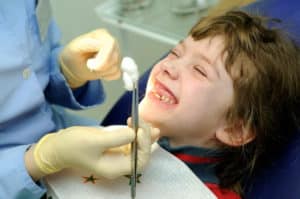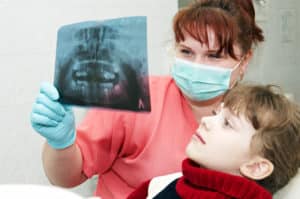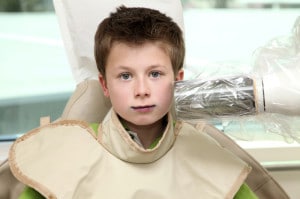Are Dental X-Rays Safe for My Child?
Dental radiographs, or x-rays, are sometimes recommended by your child’s Pediatric Dentist. As a parent, you naturally have concerns about exposing your child to radiation. Are dental x-rays safe for my child? Are they even necessary for children? Here are some clear answers for parents:
 Is it really necessary for my child to have a dental x-ray?
Is it really necessary for my child to have a dental x-ray?
Sometimes. There are a number of circumstances that require an x-ray so that your child’s Pediatric Dentist can properly assess issues that may not be visible to the naked eye. Radiographs are a great tool which enables your child’s dentist to get a clear picture of his teeth and jaw. The following are some of the reasons your child’s Pediatric Dentist might recommend an x-ray:
- Your child may have decay between teeth
- It may be possible that your child needs a crown
- Abnormalities in the root or surrounding bone structure is suspected
- You child has signs of jaw development issues
- Possible tumors or other growths may be present
- Orthodontia treatment plans
- Blockages or Sjogren’s syndrome are suspected
- Fractures of facial bones
How much radiation is my child exposed to during a typical radiograph?
Surprisingly little. We are all exposed to radiation simply by living on Earth. The amount of radiation each of us absorbs in only 14 hours of each day is equivalent to four dental bite-wing x-rays. The danger of going without proper dental treatment is greater than the danger posed by judicious use of radiographs.
Radiation exposure from dental x-rays is minimal in comparison to many other types of radiographs. According to Medical News Today (http://www.medicalnewstoday.com/articles/219970.php ), a CT Head Scan is equivalent to 243 days of natural background radiation; a chest x-ray 2.4 days.
Will you protect my child during radiographs?
Of course! Lead aprons and thyroid collars will be used to protect your child. Current technology allows us to restrict the x-ray beam to a small, targeted area. Unnecessary radiation is filtered out and today’s digital x-ray procedures are high speed and far safer than even 10 years ago.
Are x-rays recommended as a routine procedure for my child?
No. The American Academy of Pediatric Dentists recommends that x-rays be performed only when necessary to properly evaluate your child’s oral health. Your child’s unique needs will determine the necessity of radiographs. Your child’s Pediatric Dentist should discuss any recommendation for radiographs with you prior to a procedure. She will go over your child’s oral health issues and explain why she feels an x-ray is necessary.
What kinds of x-rays might be recommended for my child?
The type of x-ray your child’s Pediatric Dentist will recommend is based on your child’s specific needs. Basically, x-rays are broken down into two main categories:
1. Intraoral Radiographs. The most common x-ray procedure. These are taken with the film inside your child’s mouth. In addition to the teeth, these x-rays will allow the dentist a thorough look at the overall health of the tooth root and surrounding bone.
2. Extraoral Radiographs. These x-rays are used to detect issues in the jawbone and skull. The film will be located outside your child’s mouth.
For a detailed breakdown of each type of Intraoral and Extraoral radiographs, see our August blog https://www.caringtreechildrensdentistry.com/how-do-x-rays-work-are-there-different-types-of-x-rays-used-for-my-childs-teeth/ .
How can I make sure I’m well informed about my child’s dental procedures?
Your child’s Pediatric Dentist should explain any procedure to your satisfaction, whether it is a filling, a mouth guard, an x-ray or anything else. She’ll outline the reasons for her recommendation based on your child’s individual needs. Together, you can come up with a plan to ensure that your child has lifelong dental health and a beautiful smile.
If you are uncomfortable with or don’t understand the reason for any procedure, don’t hesitate to speak up. Understanding the benefits and risks of any recommended dental procedure is essential to a trusting relationship between you and your child’s Pediatric Dentist.














